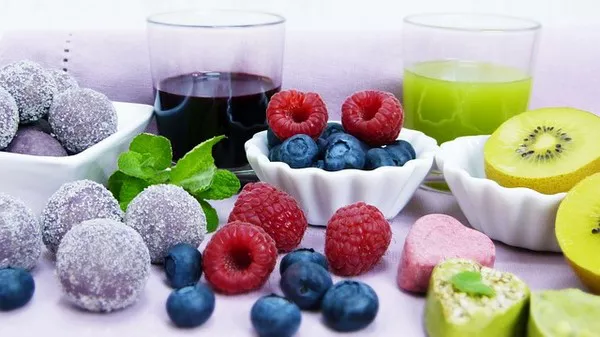Managing diabetes effectively requires careful attention to diet, including monitoring carbohydrate intake. Fruit juices, while a rich source of vitamins and minerals, can also contain high levels of sugar, which can raise blood glucose levels. As a result, people with diabetes need to be particularly cautious when choosing which fruit juices to include in their diet.
In this article, we’ll explore which fruit juices are good for diabetes patients, what to look for in a healthy juice, and how to incorporate them into a balanced diet. We will also cover some alternatives and tips to ensure better blood sugar management.
Understanding the Impact of Fruit Juice on Blood Sugar
1. Why Fruit Juice Affects Blood Glucose
Concentration of Sugar: Fruit juice, even when 100% natural, contains concentrated sugars from the fruit. Unlike whole fruits, which contain fiber, juices lack this important nutrient, leading to faster absorption of sugar into the bloodstream.
Glycemic Index: Fruit juices tend to have a higher glycemic index (GI) compared to whole fruits. The glycemic index is a measure of how quickly a food raises blood sugar levels. Foods and drinks with a high GI can cause rapid spikes in glucose, making blood sugar harder to manage.
2. The Role of Portion Size
Moderation is Key: For people with diabetes, the key to safely consuming fruit juice lies in portion control. Even juices that are lower in sugar or have a lower glycemic index can still affect blood sugar if consumed in large quantities.
Serving Sizes: A typical serving of fruit juice for someone with diabetes should be about 4 to 6 ounces. This small portion can provide the nutrients from the juice without overwhelming the body with excess sugar.
Best Fruit Juices for Sugar Patients
1. Lemon or Lime Juice
Low in Sugar: Lemon and lime juice are two of the best options for sugar patients. They are extremely low in sugar and have a negligible effect on blood glucose levels.
Rich in Vitamin C: Both lemon and lime are excellent sources of vitamin C, an antioxidant that supports the immune system and overall health.
Usage Tips: Instead of drinking lemon or lime juice alone, it’s best to dilute it with water to make a refreshing, low-calorie beverage. Lemon or lime water can be a great alternative to sugary drinks.
2. Cranberry Juice (Unsweetened)
Benefits for the Urinary Tract: Cranberry juice is well known for its benefits to urinary tract health. It contains compounds that help prevent infections, which can be important for diabetics who are more prone to infections.
Low Sugar Option: Make sure to choose unsweetened cranberry juice. Many commercially available cranberry juices are sweetened with added sugars, which are not suitable for diabetes patients.
How to Use: For a tart yet healthy drink, dilute unsweetened cranberry juice with water or mix it with a splash of lemon juice for added flavor.
3. Pomegranate Juice
High in Antioxidants: Pomegranate juice is packed with antioxidants, which help reduce inflammation and protect against cardiovascular disease. This is particularly beneficial for diabetics who are at higher risk of heart disease.
Moderate Glycemic Index: Pomegranate juice has a moderate glycemic index, meaning it causes a slower rise in blood sugar compared to other fruit juices like orange or apple juice.
Serving Suggestions: Enjoy pomegranate juice in small amounts and ensure it’s unsweetened. About 4 to 6 ounces per serving is ideal to enjoy the benefits without risking a glucose spike.
4. Grapefruit Juice
Low Glycemic Index: Grapefruit juice has a relatively low glycemic index compared to other fruit juices, making it a safer option for blood sugar management.
Heart Health: Grapefruit juice is also known for its heart health benefits due to its ability to lower cholesterol levels.
Important Note: Grapefruit juice can interact with certain medications, including some used to manage diabetes. Always consult with a doctor before including grapefruit juice in your diet if you are on medication.
5. Green Apple Juice (Unsweetened)
Lower in Sugar: Compared to red apples, green apples tend to have slightly less sugar, making green apple juice a better option for sugar patients.
Rich in Nutrients: Green apple juice is a good source of vitamin C, potassium, and other important nutrients.
How to Consume: As with other juices, keep portion sizes small and opt for unsweetened versions. Combining apple juice with water can dilute the sugar content and make it a more suitable drink for diabetes.
6. Carrot Juice
Low Glycemic Index: Though not a fruit, carrot juice deserves a mention for its low glycemic index and its rich nutrient profile. It provides a sweet flavor without spiking blood sugar as much as other juices.
Rich in Beta-Carotene: Carrot juice is an excellent source of beta-carotene, an antioxidant that supports eye health—a critical concern for diabetics.
How to Use: A small glass of carrot juice can be consumed as part of a balanced diet, but it’s essential to watch the portion size to avoid excessive sugar intake.
7. Blueberry Juice
Rich in Antioxidants: Blueberry juice is rich in antioxidants, particularly anthocyanins, which have been shown to help regulate blood sugar levels.
Moderate Glycemic Index: While blueberry juice is moderately sweet, it doesn’t cause rapid blood sugar spikes when consumed in moderation.
How to Use: Look for unsweetened blueberry juice or consider making your own by blending fresh blueberries with water.
Fruit Juices to Avoid for Sugar Patients
1. Orange Juice
High in Sugar: Orange juice is one of the most popular fruit juices, but it is also high in natural sugars. This can cause a rapid spike in blood glucose levels.
Lack of Fiber: While whole oranges contain fiber that helps slow down sugar absorption, juice lacks this essential nutrient, making it more harmful to blood sugar control.
2. Grape Juice
Very High Glycemic Index: Grape juice has one of the highest glycemic indexes of any fruit juice, making it a poor choice for diabetics.
Potential Blood Sugar Spikes: Even small amounts of grape juice can cause significant spikes in blood sugar, so it’s best avoided or consumed only in very small quantities.
3. Pineapple Juice
High Sugar Content: Pineapple juice is naturally very sweet, which means it contains a high amount of sugar. Like orange juice, it lacks the fiber to mitigate its impact on blood glucose levels.
Glycemic Index: The high glycemic index of pineapple juice can make it difficult to manage blood sugar levels.
Healthy Alternatives to Fruit Juice for Diabetes Patients
1. Infused Water
Low-Calorie: Infused water, made by adding slices of fruits like lemon, cucumber, or berries to water, is a healthy, low-calorie alternative to fruit juice.
Hydration with Flavor: This option allows you to enjoy the refreshing flavor of fruits without the risk of spiking your blood sugar.
2. Herbal Teas
Natural Sweetness: Herbal teas, such as chamomile, peppermint, or hibiscus, can provide a naturally sweet flavor without any added sugar.
Rich in Antioxidants: Many herbal teas are rich in antioxidants and can offer health benefits without negatively affecting blood sugar levels.
3. Vegetable Juices
Low in Sugar: Vegetable juices, especially from non-starchy vegetables like spinach, kale, or cucumber, are a great option for sugar patients. They are low in sugar and packed with vitamins and minerals.
Blood Sugar Control: These juices have a minimal effect on blood sugar, making them a safe choice for people with diabetes.
Tips for Consuming Juice with Diabetes
1. Always Check Labels
Read Ingredients: If you’re buying juice from the store, always check the ingredients list to ensure there are no added sugars. Many fruit juices are sweetened with additional sugars, which can be harmful to diabetes management.
Look for 100% Juice: Choose 100% juice with no added sugars or artificial sweeteners. Even 100% juice should be consumed in moderation due to its natural sugar content.
2. Dilute Juices with Water
Reduce Sugar Intake: Diluting juice with water can help lower the overall sugar content while still allowing you to enjoy the flavor.
Better Hydration: This method not only reduces sugar but also helps with hydration, which is especially important for people with diabetes.
3. Focus on Portion Control
Limit to Small Servings: Stick to small portions—4 to 6 ounces at most. This helps manage blood sugar while still allowing you to enjoy fruit juices in moderation.
Monitor Blood Sugar: After consuming juice, monitor your blood sugar levels to see how your body reacts and adjust your intake accordingly.
See also: What Type of Cereal Can a Diabetic Eat?
Conclusion
Choosing the right fruit juice for diabetes patients involves considering the sugar content, glycemic index, and portion size. While many popular juices like orange and grape juice should be avoided due to their high sugar content, options like lemon juice, unsweetened cranberry juice, and pomegranate juice can be included in a diabetic-friendly diet when consumed in moderation. Always read labels carefully, avoid added sugars, and focus on small servings to keep your blood sugar levels in check.
By making informed choices and monitoring your blood sugar, you can enjoy the refreshing taste of fruit juices while maintaining healthy blood glucose levels.
Related topics:
What Type of Snacks Can a Diabetic Eat?

























